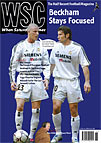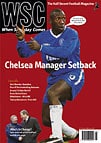Dear WSC
Dave Boyle’s article Count Me Out (WSC 207) prompted me to finally come clean about my rather bizarre obsession with shirt numbers. While players wearing 77 seems rather farcical, what gets my goat are squad numbers that bear no relation to the owner’s position. Why does Markus Babbel wear No 11 even though he’s a defender? What is Liverpool striker Milan Baros doing wearing No 5? Even during a game of Championship Manager I can’t get away from it: the other day I discovered that Barcelona had signed Alessandro Nesta and given him No 1. Unbelievable. But what I really need to get off my chest is a somewhat strange habit of mine. For some reason I can’t walk past a replica shirt-wearer in the high street without running round to see whether they have a name and number on the back. I’ve been doing this for quite a while now, so you can imagine my delight when my wife picked up the habit too. We now have a rudimentary scoring system, whereby teams receive one point for a fan wearing a “plain” shirt and two for someone with a named and numbered-up top. I was hoping that someone might come forward and reassure me that I’m not the only one out there looking at supporters’ backs, but I’ll understand if you all want to remain anonymous about it.
Joe Newman, Brighton
Search: ' grounds'
Stories
 Dingwall, home of Ross County, is the smallest town in Great Britain with a senior league club. Gordon Cairns explains the secret of their success against Inverness
Dingwall, home of Ross County, is the smallest town in Great Britain with a senior league club. Gordon Cairns explains the secret of their success against Inverness
When the Scottish Football League was formed in 1890, the founding members gave their new organisation a very misleading title. The clubs were clustered within Scotland’s industrial heartland – the central belt – and could hardly be said to represent the nation. Only now, with two Highland teams, Inverness Caledonian Thistle and Ross County, on the cusp of the Premier League, can top-level football truly be seen to encompass the country. These two teams have reached this position ten years after admission, but whether they can take the next step up depends on the whims of the clubs who make up the Premier League.
 Chaos and farce reign in Scotland, where the Premier League's anti-groundsharing stance has been underminded from within. Chris Fyfe makes some sense of it all
Chaos and farce reign in Scotland, where the Premier League's anti-groundsharing stance has been underminded from within. Chris Fyfe makes some sense of it all
That Partick Thistle are bottom of the Scottish Premier League this season is primarily due to having a very poor manager for the first 14 games. By the time Gerry Collins was shown the door the struggling Glasgow club had two points and were destined for bottom spot. But life in the SPL is never simple. Thistle will not know if they are relegated until May 30. This is the deadline set by the SPL to the two aspiring First Division clubs (Clyde and Inverness Caledonian Thistle) and also Falkirk to find a ground to share that has the 10,000 seats required for promotion.
 Is ITV's former pundit an idiot, a racist, or both? Al Needham wonders whether that is what matters most about a pundit's fall from grace, or whether his fate tells us how far we have come and how far we have to go
Is ITV's former pundit an idiot, a racist, or both? Al Needham wonders whether that is what matters most about a pundit's fall from grace, or whether his fate tells us how far we have come and how far we have to go
In the end, after all the finger-pointing, hair-shirt wearing, editorials and think-pieces, the only truly shocking thing about what Ron Atkinson said was that, for pretty much the first time in his public life, he came out with a phrase that came frighteningly close to plain English. He didn’t describe Marcel Desailly as “totally nigmatic with his workrate, to be enocular”. He refrained from mentioning that the Chelsea defender had been “giving it big lips all game”. He didn’t even advocate giving minorities the full gun, or bunging them in the mixer.
 The recent racism row between Millwall and Burnley overlooked the work both clubs do to improve community relations. Glen Poole reports from the Lancashire town on their current equality projects
The recent racism row between Millwall and Burnley overlooked the work both clubs do to improve community relations. Glen Poole reports from the Lancashire town on their current equality projects
What are Burnley doing to tackle racism? Alastair Campbell sparked a major incident in March when he accused Millwall fans of racism towards Burnley players in his Times column. Stan Ternent, Theo Paphitis and even former Radio Four bad-boy Rod Liddle waded into the fight. But Campbell – a lifelong Burnley fan – had raised an important point that was lost amid the sound of handbags clashing. It isn’t just clubs that have to take responsibility for the problem, but also fans and communities. The issue of racism beyond the terraces is particularly pertinent in Burnley, where the disturbances of 2001 and the subsequent BNP electoral gains have placed the town in the media spotlight.